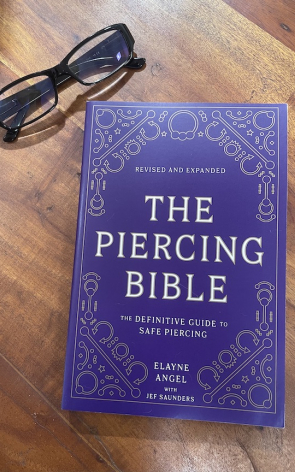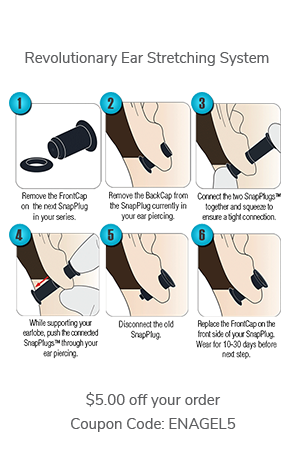I write a monthly question-and-answer column for Pain Magazine, an industry trade publication for body art professionals. This isn't really on the subject of body art, but it contains information that could be useful to you or someone you know, so I've decided to reprint it here.
Ask Elayne Angel
This isn’t really a piercing question but I figured I’ve got nothing to lose, so here goes: I have a terrible feeling inside like I have got nothing to live for.
I have had depression in the past and also problems with substance abuse: drinking and certain drugs of choice. I used to cut on myself, but I haven’t done that in a long time. I really thought I had gotten my life together.
I love being a piercer and I am working at the best job I’ve ever had in my life. My boss is an awesome guy, and everything is going great at work. I live in a nice apartment with a pretty cool roommate and the best cat in the world.
My life is so much better than it used to be, which is why it seems so crazy that I just feel like giving up. I guess it must be depression again. When I watch the news it is so overwhelming to see everything that is wrong with the world. And then I see all these famous people are committing suicide and think that might be the way for me to go. I know this is heavy and I’m sorry to lay it on you like this.
I always read your Pain Magazine articles and have met you at the APP conference and taken classes from you a few times. You seem like a caring person, and are always so upbeat, happy and positive. How do you do it?
Thanks for reading my message.
W.
Dear W.,
I’m so glad you reached out to me. Please do NOT give up, and don’t do anything to harm yourself. I understand that you are suffering, but help isavailable!
If you’re feeling the same as when you emailed me, pleasemake use of one the resources below to connect with an expert counselor RIGHT NOW. Call1-800-273-TALK (8255) or 1-800-SUICIDE. That’s the National Suicide Prevention Lifeline,a network of local crisis centersavailable twenty-four hours a day, seven days a week: Their website also has live chat: https://suicidepreventionlifeline.org
They provide confidential emotional support to people in suicidal crisis or emotional distress at no cost. Anyone can call who is depressed, going through a hard time, needs to talk, or is thinking about suicide. The counselors are there to listen and support you through whatever difficult times you may be experiencing.
Their goal is to help you reduce stress and feel empowered to make healthy decisions. If a chat counselor feels you are in danger they will speak with you about accessing emergency services, and/or gather additional information to ensure your safety. The counselor will work with you to create a safety plan if necessary.
Another option is to text 741741from anywhere in the USA to text with a trained crisis counselor.
If/when you’re feeling better and not in crisis, then you can go ahead and read on. But should your hopeless feelings return, pleaseseek expert help right away!
Also, you can read more about mental health here, and depression here.
Rest assured I’m not judging you, and in fact, I am proud of you for reaching out. That indicates you want assistance, and I’m very happy to see that! Whatever it is that you are going through, there is hope and I promise it can get better—even if it is hard for you to see that right now. You are not alone! I am not a mental health professional, but I care about you and want to help.
I am sure that there are other people in your life who feel the same way. Are you close with your roommate or other friends, work colleagues, and/or members of your family or community? If you haven’t spoken with any of them about your feelings, it would be good to share what you’re going through with the most trusted of your contacts. Don’t isolate yourself; connectedness is important! Supportive social relationships and community ties really can help.
Depression is an incredibly common, highly treatable medical illness. It is estimated that one in five adults lives with a mental health disorder[i]. There are numerous options to explore for getting help. Treatment for depression typically consists of psychotherapy and medication.[ii]Even if you have received treatment before, or if you’ve made attempts to solve your problems, know that it’s sometimes necessary to try different approaches. When medication is prescribed, for example, finding the right dosage often requires an ongoing process of adjustment. It can take a while to discover the optimal treatment but recovery ispossible. Don’t give up before figuring out what works for you.
There’s lots of online resources[iii]too, including a depression screening[iv], The American Foundation for Suicide Prevention[v], and even suicide prevention apps for your phone[vi]. Make use of anything and everything you can to improve your condition.
I do tend to be a happy, optimistic person, and I purposely cultivate those aspects of myself. I believe that my mental health is reinforced by my positive lifestyle habits: eating a nutritious vegan diet, prioritizing sleep, and meditating daily. I use an app called Insight Timer, which I find extremely helpful. It contains over 10,000 free guided meditations! The exercise I do regularly also promotes emotional well-being because it releases endorphins and relieves stress. My routines work great for me, but each of us has to find what works best for ourselves.
I also want you to know that I have plenty of empathy and some comprehension of the misery you’re going through. I suffered from severe situational depression after losing my successful Sign Language interpreting career to a terrible case of painful tendinitis in both forearms. All at once, I lost everything: my livelihood, friends and community, and preferred language. As a result, I became terribly depressed. Fortunately, I didn’t give up; I sought treatment from a mental health professional and took medication. Over time I came back to my usual sunny self.
Severe depression can strike even when life is good. Whatever the underlying cause, it is essential that you seek treatment with a mental health professional such as a psychiatrist, psychologist, social worker, family therapist, or counselor with mental health training.They know many ways to improve mental wellness and resiliency. You can find these professionalsin emergency departments, hospitals, clinics, schools, community centers, and private practices.
How mental health professionals help[vii]
- If you feel unhappy, depressed, anxious, fearful, or in need of emotional support, a mental health professional can help you to understand your problems and feel better.
- They have specialized training to identify and understand problems that may be causing you discomfort or putting you at risk.
- They are trained to offer an objective, independent viewpoint.
- If you need it, they can prescribe medicine or connect you with someone who can determine if you need medication, or refer you to other professionals and specialists, if needed.
You’re welcome to write to me any time. But I think it would be even better if you can open up to someone who is physically present in your life. Try to keep in mind that ouremotions are not fixed—they are constantly changing. How you feel today may not be the same as how you felt yesterday or how you'll feel tomorrow or next week. Please get help and know that there is hope!




